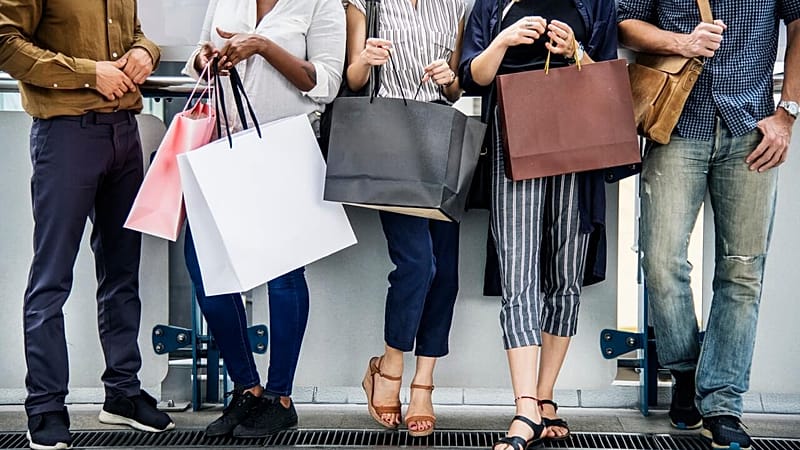The Black Friday trap: The psychological keys that trigger consumerism

It is one of the biggest consumer events. Every November, Black Friday turns shops and social networks into a whirlwind of discounts, urgency and supposedly unrepeatable opportunities.
A scenario that activates the psychological reactions that push us to buy: anxiety, the feeling of scarcity, or the fear of being left out.
And those who feel it most are young people. According to Spanish psychologist Laura Lobo, they are "more susceptible" to these dynamics because "they are much more involved in consumption", something that is also reflected in the data.
According to a global DHL eCommerce Trends Report, nearly nine out of ten retailers are gearing up to take part in Black Friday this year, as 60 per cent of them experienced increased sales revenues in 2024 compared to 2023.
The report also noted that 56 per cent of Gen Z trust retailers' prices, compared to just 38 per cent of Baby Boomers.
But why is it so hard for us to resist the offers, and how can we approach this key date more consciously?
Anxiety as a driver of consumption
According to Lobo, the current context is key to understanding why Black Friday attracts so many people.
"We are at a time when we are kind of agitated and very anxious. Anxiety is always there in our daily lives," he explains to Euronews. This permanent restlessness acts as a breeding ground to make a consumer-oriented event even more attractive.
The psychologist reminds us that the human mind tends to focus on what is "missing": an object, a goal or a desire. Shopping then appears as a momentary way to fill that void.
"We are all thinking all the time about the things we are missing (...) and once you get it, that lasts momentarily," she said.
Black Friday connects with that immediate impulse, more linked to anxious needs than to meditated decisions, she added.
Lobo acknowledged that there is an addictive component to certain consumption patterns.
"There is more and more of that (...) because we are in such a fast-paced and ephemeral society that something produces value in a very short time. The market constantly offers new and improved products, reinforcing the idea that what is new is always better," she said.
Added to this is a low tolerance for the fact that things are always missing in life.
"There is less and less tolerance for putting up with those things that are missing.That is why many buyers seek to mitigate anxiety with an object that, in reality, does not bring lasting well-being," she said.
"That emptiness does not last at all, because you cover it with an object and that is not the way things go".
Social pressure and the fear of being left out
But there is another fundamental element in understanding consumer culture: social pressure and the fear of being left out. Lobo points out that FOMO ('Fear of missing out'), that fear of missing out on something, is intensified on dates such as Black Friday, when everything seems like a unique opportunity.
"We focus a lot on the fact that we can't miss out on anything, and that if we don't buy it we'll be left out," she said.
That feeling is especially reinforced on social networks, where seeing others buy, recommend or show off their purchases generates a contagious dynamic. The constant comparison and the desire to belong mean that many end up making purchases they hadn't really planned to make.
And it is in this same field, that of social influence and the search for belonging, where influencers play a decisive role. For Lobo, their effectiveness is not only due to the visibility they have, but also to a growing lack of reflective capacity in society.
"Today, we have less symbolic or reflective capacity. We are very much in the mode of acting, but not in thinking about them," she said.
Many transfer this capacity for reflection (what to buy, why and what for) to external figures: political, social or digital leaders.
"It's like someone to think for you," he says. In addition, the influence of the group is powerful: belonging to the "club" that dresses or consumes certain things generates identity.
How to deal with Black Friday in a healthy way
The psychologist makes a clear recommendation: allow time for reflection. She suggests asking yourself questions before buying:
- Do I really need it?
- Have I wanted it for a long time, or just because someone else has it?
- Does the purchase make sense, or does it respond to a momentary impulse?
- How long will the satisfaction last?
"It is important to stop and think if it is really more than a necessity (...) and if I am going to give meaning to what I am going to buy," she said.
The key is to differentiate the desired, something thought about, meditated, or even fantasised about for a while, from the impulsive and anxious.
Interestingly, the expert points out that the same society that encourages hyper-consumption also seeks, in parallel, ways to "detox": retreats, wellness, and connection with nature. A sign that there is a generalised tiredness in the face of the constant wheel of stimuli.
Today

